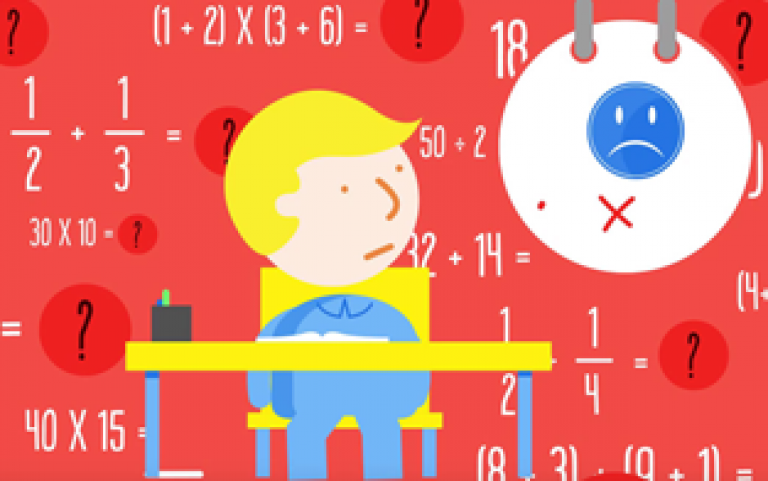Learning lessons from the UK's maths problem
Professor Rose Luckin, UCL Institute of Education Knowledge Lab leading on numeracy skills grading algorithm project in partnership with Third Space Learning

30 May 2017
In 2016, international league tables published by the Programme for International Assessment (Pisa), which are published every three years by the Organisation for Economic Co-operation and Development (OECD), ranked the UK in 27th place overall in the world in maths.
There are many reasons put forward for the UK's poor numeracy levels but the chronic shortage of maths teachers in the UK - particularly at primary level - is certainly one. In fact, less than 2% of primary school teachers have maths-related degrees.
Why maths matters
Poor numeracy skills have an adverse impact on the UK economy and many individuals. People with poor numeracy are twice as likely to be unemployed and according to the National Numeracy study in 2015, UK children from poor backgrounds are twice as likely to fail academically. While that can be a life-long tragedy for those youngsters, it's reckoned that poor numeracy costs the UK economy some £20 billion per year.
The UK Government's Pupil Premium provides around £2.8 billion in additional budget to publically funded schools in England to raise the attainment of disadvantaged pupils - including the teaching of maths. However, it appears to have fallen short of that goal as 48% of local authorities actually saw attainment gaps increase in 2014.
A new vision for 1-to-1 tuition
Reversing the downward trend in numeracy is possible through 1-to-1 maths tuition, which can enable primary school students to catch up. But although schools have the ability to identify pupils requiring support and unlock Pupil Premium funding, they may lack the resources to implement 1-to-1 tuition at scale. Plus there may not be enough suitably qualified and experienced maths tutors available to step in.
To help address the nation's numeracy weaknesses and our maths teacher shortage, Third Space Learning (TSL) recruits maths graduates from around the world to provide 1-to-1 maths tuition in 'virtual' classrooms accessed by UK pupils. Already, over 180 schools engage in over 2,000 TSL sessions each week.
The maths tuition that TSL offers is via a personalised weekly 45 minute lesson, where each pupil has their own specialist tutor and they work together online. The way the TSL solution works is designed by teachers for teachers; not to replace them but to enhance what they do. In fact, each pupil's personalised learning pathway is approved by their class teacher.
A better way to assess quality
Understandably, teachers and parents want to know the tutors delivering these virtual maths lessons are capable, efficient and effective. So to maintain a high level of quality, TSL assessors have in the past manually reviewed and graded 5% of sessions weekly. Trouble is, this is a costly, inefficient and inconsistent process that restricts the uptake of TSL's virtual methodology.
A chance meeting at a UCL Institute of Education (IOE) Knowledge Lab event around five years ago got TSL CEO, Tom Hooper, and Professor Rose Luckin of UCL IOE's Knowledge Lab talking. Over the years that followed their discussion turned to how AI might provide a better, more efficient method for assessing TSL tutors. This has resulted in the two organisations working in partnership on the MATH project to develop an automated session grading algorithm to monitor tutor quality and determine its correlation to learning outcomes.
The agreement was arranged and managed by UCL Consultants and has resulted in the first steps towards a quality assurance system that will help ensure high quality teaching, leading to better outcomes for pupils, while allowing TSL to automatically analyse tutor performance, identify best practice and develop excellence at scale.
Professor Luckin, who has been developing and writing about the Learning Sciences, Educational Technology and Artificial Intelligence in Education (AIEd) for over 20 years, commented, 'The development of the TSL tutor evaluation process is made possible by AI. We're currently working with TSL on a new joint initiative to develop an automated, AI-driven Continuing Professional Development (CPD) system for tutors, so that tutors can improve their tutoring and can also be kept up to date with the latest developments in teaching and the subject.'
She concluded, 'This could be just the start of an exciting era for 'virtual' education. The AI we use will enable TSL to tutor less able pupils, and could equally well be used to help our brightest advance faster or deliver the same level of personal, high quality tuition to pupils in other curriculum subjects.'
 Close
Close


